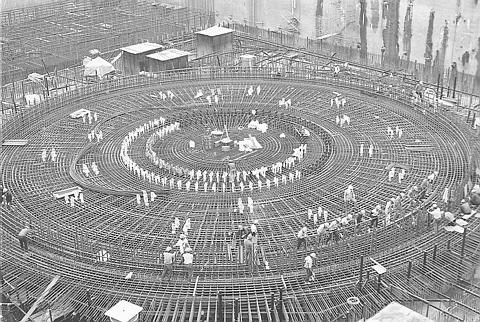Anti-nuclear environmentalists and legislators called for a delay of the construction the island's fourth nuclear power plant after locating several problems during a field investigation yesterday.
Taiwan Power Company (
Following the 921 earthquake last month, lawmakers and environmentalists have asked for a comprehensive review of the safety of Taiwan's three existing nuclear power plants.

PHOTO: CHEN CHENG-CHANG, TAIPEI TIMES
In addition, they have also urged the government to reconsider plans for a fourth nuclear power plant, which is located near five known fault lines.
DPP lawmakers Lin Chung-mo (
"The plant is designed to resist big earthquakes. But we don't think a devastating tremor like the 921 earthquake would happen here because the five faults nearby have been identified as inactive," said Lin Chu-wan (
According to Taipower, the construction of the plant, initiated last year, is currently 29 percent complete and will be finished by 2005. So far, the company has invested NT$36.4 billion in the project.
Although earthquake-sensing equipment has yet to be established at the site, Lin said that several instruments have been set up to monitor construction conditions, including pressure, tension, and displacement to ensure safety.
During the field investigation, the three lawmakers observed problems such as rusty reinforcing bars and seawater seeping into the foundation of the plant, which has long worried residents living nearby. Residents in the area have asked that construction of the plant be suspended.
"We don't think it's a good idea to continue construction until the confusion that local residents feel is dispelled," said DPP lawmaker Lin.
However, Taipower officials said that the things the lawmakers were concerned about were actually within guidelines.
"We engineers think the current situation (the existence of rust on reinforce bars) is allowable," Taipower's Lin said.
In addition, Lin that said groundwater around the site has been monitored carefully to see if any seawater has penetrated the construction site.
However, activists from the Taiwan Environmental Protection Union (
Taipower has been using nuclear power as one of its energy sources since 1964.
However, building nuclear power plants has become a tedious process as disputes between the government and environmentalists have become common-place.
It wasn't until 1978 that the first nuclear power plant started operating.
Since then, environmental activists have brought several controversial environmental protection issues to light, including the death of clustered coral near hot waste water discharge pipes from plants and other coastal ecology problems.

Intelligence agents have recorded 510,000 instances of “controversial information” being spread online by the Chinese Communist Party (CCP) so far this year, the National Security Bureau (NSB) said in a report yesterday, as it warned of artificial intelligence (AI) being employed to generate destabilizing misinformation. The bureau submitted a written report to the Legislative Yuan in preparation for National Security Bureau Director-General Tsai Ming-yen’s (蔡明彥) appearance before the Foreign Affairs and National Defense Committee today. The CCP has been using cognitive warfare to divide Taiwanese society by commenting on controversial issues such as Taiwan Semiconductor Manufacturing Co’s (TSMC, 台積電) investments in the

INVESTIGATION: The case is the latest instance of a DPP figure being implicated in an espionage network accused of allegedly leaking information to Chinese intelligence Democratic Progressive Party (DPP) member Ho Jen-chieh (何仁傑) was detained and held incommunicado yesterday on suspicion of spying for China during his tenure as assistant to then-minister of foreign affairs Joseph Wu (吳釗燮). The Taipei District Prosecutors’ Office said Ho was implicated during its investigation into alleged spying activities by former Presidential Office consultant Wu Shang-yu (吳尚雨). Prosecutors said there is reason to believe Ho breached the National Security Act (國家安全法) by leaking classified Ministry of Foreign Affairs information to Chinese intelligence. Following interrogation, prosecutors petitioned the Taipei District Court to detain Ho, citing concerns over potential collusion or tampering of evidence. The

‘COMPREHENSIVE PLAN’: Lin Chia-lung said that the government was ready to talk about a variety of issues, including investment in and purchases from the US The National Stabilization Fund (NSF) yesterday announced that it would step in to staunch stock market losses for the ninth time in the nation’s history. An NSF board meeting, originally scheduled for Monday next week, was moved to yesterday after stocks plummeted in the wake of US President Donald Trump’s announcement of 32 percent tariffs on Taiwan on Wednesday last week. Board members voted to support the stock market with the NT$500 billion (US$15.15 billion) fund, with injections of funds to begin as soon as today. The NSF in 2000 injected NT$120 billion to stabilize stocks, the most ever. The lowest amount it

NEGOTIATIONS: Taiwan has good relations with Washington and the outlook for the negotiations looks promising, Minister of Economic Affairs J.W. Kuo said Taiwan’s GDP growth this year is expected to decrease by 0.43 to 1.61 percentage points due to the effects of US tariffs, National Development Council (NDC) Minister Paul Liu (劉鏡清) said at a meeting of the legislature’s Economics Committee in Taipei yesterday, citing a preliminary estimate by a private research institution. Taiwan’s economy would be significantly affected by the 32 percent “reciprocal” tariffs slapped by the US, which took effect yesterday, Liu said, adding that GDP growth could fall below 3 percent and potentially even dip below 2 percent to 1.53 percent this year. The council has commissioned another institution